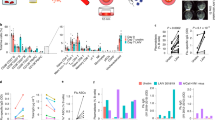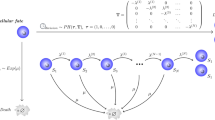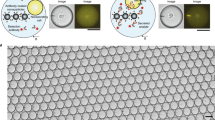Abstract
IT has been suggested that the interaction which occurs between lymphoid cells of two individuals in mixed cell cultures provides a measure of histocompatibility difference1–4. This suggestion is based on the assumption that the interaction, which takes the form of a proliferative response, is immunological in nature. While most work has been performed with human cells, it is obviously desirable that this assumption is tested in situations where histocompatibility difference can be precisely defined, as in inbred strains of the rat and mouse, Wilson5,6 has shown that in mixed cultures of parental strain and F1 hybrid rat cells most of the response is parental in type, as would be expected for an interaction with an immune basis. Dutton7,8 has demonstrated a proliferative response in short term mixed spleen cell cultures of mouse origin. Murine cells, however, have proved refractory to growth in vitro during long periods and, to facilitate their survival and function, Nettescheim et al.9,10 have cultured them in diffusion chambers in vivo. We have followed this method to examine the interaction between mixed suspensions of mouse spleen cells paying particular attention to the comparative proliferation of cells from C57Bl and CBA H-T6T6 to each other and to their F1 hybrid. The presence of two T6 marker chromosomes in CBA H-T6T6 cells and of a single T6 chromosome in F1 cells enables the direction of the response to be determined and so, in parental type/F1 hybrid mixtures, provides evidence for the immunological specificity of the reaction.
This is a preview of subscription content, access via your institution
Access options
Subscribe to this journal
Receive 51 print issues and online access
$199.00 per year
only $3.90 per issue
Buy this article
- Purchase on Springer Link
- Instant access to full article PDF
Prices may be subject to local taxes which are calculated during checkout
Similar content being viewed by others
References
Bach, F. H., and Hirschhorn, K., Science, 143, 813 (1964).
Bain, B., and Lowenstein, L., Science, 145, 1315 (1964).
Chalmers, D. G., Coulson, A. S., Evans, C., and Yealland, S., Intern. Arch. Allergy, 30, 177 (1966).
Bach, F. H., and Kisken, W. A., Transplantation, 5, 1046 (1967).
Wilson, D. B., J. Exp. Med., 126, 625 (1967).
Wilson, D. B., Silvers, W. K., and Nowell, P. C., J. Exp. Med., 126, 655 (1967).
Dutton, R. W., J. Exp. Med., 122, 759 (1965).
Dutton, R. W., J. Exp. Med., 123, 665 (1966).
Nettescheim, P., and Makinodan, T., J. Immunol., 94, 868 (1965).
Nettescheim, P., Makinodan, T., and Chadwick, C. J., Immunology, 11, 427 (1966).
Ford, C. E., in Tissue Grafting and Radiation (Academic Press, New York, 1966).
Fox, M., Nature, 195, 1024 (1962).
Fox, M., Immunology, 5, 489 (1962).
Author information
Authors and Affiliations
Rights and permissions
About this article
Cite this article
HARRISON, G., OWEN, J. & RITTER, M. Interaction of Mouse Spleen Cells in Diffusion Chambers. Nature 219, 302–303 (1968). https://doi.org/10.1038/219302a0
Received:
Published:
Issue Date:
DOI: https://doi.org/10.1038/219302a0
Comments
By submitting a comment you agree to abide by our Terms and Community Guidelines. If you find something abusive or that does not comply with our terms or guidelines please flag it as inappropriate.



